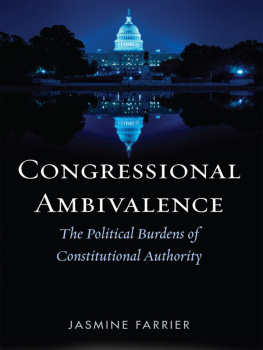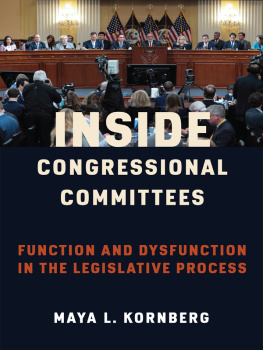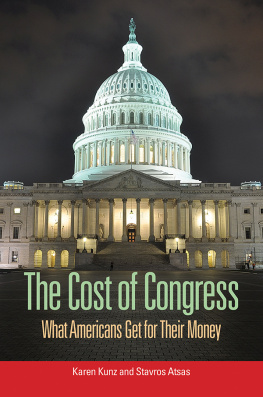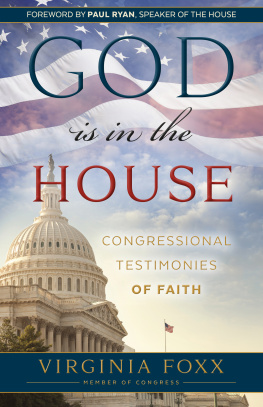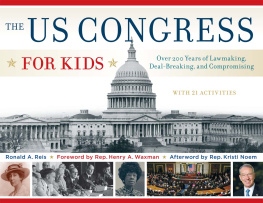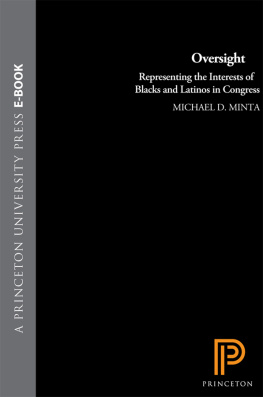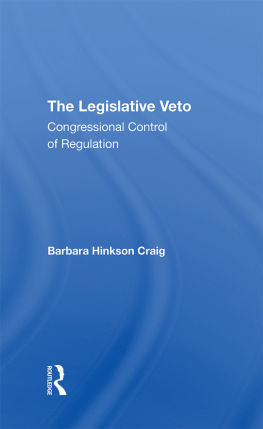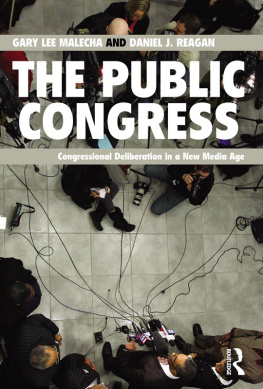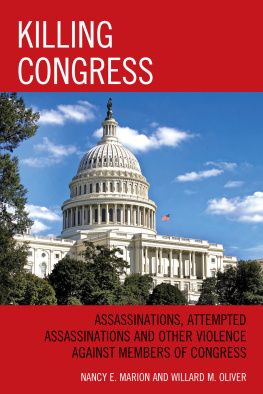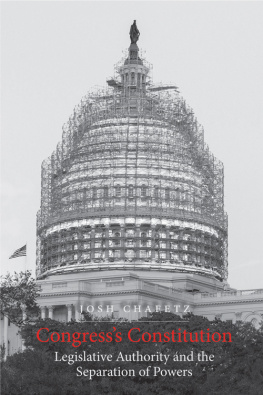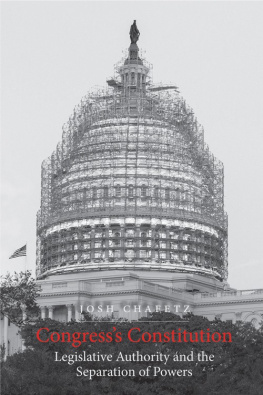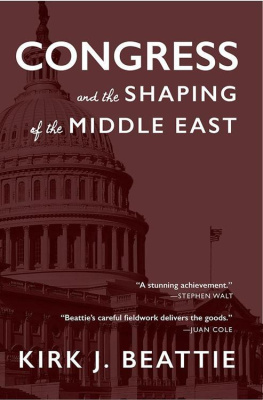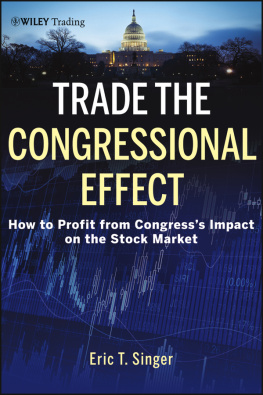CONGRESSIONAL
AMBIVALENCE
The Political Burdens of
Constitutional Authority
JASMINE FARRIER
THE UNIVERSITY PRESS OF KENTUCKY
Copyright 2010 by The University Press of Kentucky
Scholarly publisher for the Commonwealth,
serving Bellarmine University, Berea College, Centre College of Kentucky,
Eastern Kentucky University, The Filson Historical Society, Georgetown
College, Kentucky Historical Society, Kentucky State University,
Morehead State University, Murray State University, Northern Kentucky
University, Transylvania University, University of Kentucky, University of
Louisville, and Western Kentucky University.
All rights reserved.
Editorial and Sales Offices: The University Press of Kentucky
663 South Limestone Street, Lexington, Kentucky 40508-4008
www.kentuckypress.com
14 13 12 11 10 5 4 3 2 1
Library of Congress Cataloging-in-Publication Data
Farrier, Jasmine, 1970
Congressional ambivalence : the political burdens of constitutional
authority / Jasmine Farrier.
p. cm.
Includes bibliographical references and index.
ISBN 978-0-8131-9262-8 (hardcover : alk. paper)
1. United States. Congress. 2. United States. CongressPowers and duties.
I. Title.
JK1021.F36 2010
328.73074dc22 2009053158
This book is printed on acid-free recycled paper meeting
the requirements of the American National Standard
for Permanence in Paper for Printed Library Materials.
Manufactured in the United States of America.
Member of the Association of
American University Presses
To Dan
Acknowledgments
This book is a sibling to Passing the Buck: Congress, the Budget, and Deficits (2004). In May 2001, as a dissertation fellow at the Miller Center of Public Affairs at the University of Virginia, I presented a paper on the curious institutional and political history of the line-item veto movement. At that moment, however, deficits and budget reform were (temporarily) off the political radar screen. So the conversation turned to whether my research approach was relevant to other, still-simmering policy dilemmas that also drove Congress to sacrifice institutional prerogatives, such as military base closures and fast-track trade implementation rules. I was instantly intrigued. A few months later came September 11, and Congress renewed its institutional identity struggles under novel circumstances. The new book project aimed to make sense of Congress's problematic place in contemporary separation of powers arrangements by examining all of these issue areas for patterns in rhetoric and action.
As Congressional Ambivalence evolved, I was fortunate to have expert guidance. I am deeply grateful to Lawrence C. DODd, Daniel J. Palazzolo, and James P. Pfiffner for their close reading of the book manuscript and insightful suggestions. I am also thankful for conference paper feedback (often with extensive email follow-up) from Joseph M. Bessette, Louis Fisher, Richard M. Pious, Randall W. Strahan, and Jeffrey K. Tulis. In addition, I drew on the case studies in this book to contribute articles to PS: Political Science and Politics (2007) and Presidential Studies Quarterly (2010), refining my arguments in the process. My chapter in The Constitutional Presidency (2009), edited by Bessette and Tulis, blended my budget arguments from this book and Passing the Buck. For a sabbatical semester and other forms of research and institutional assistance, I thank the Department of Political Science and the College of Arts and Sciences at the University of Louisville. I must also express my heartfelt appreciation for Stephen M. Wrinn, the indefatigable director of the University Press of Kentucky, and his expert staff for their enthusiasm and efficiency.
Finally, I must acknowledge my wonderful home team. My daughters, Tovah and Talia, went from being a toddler and a baby at the beginning of this project to elementary school students at its completion. At home and school, they have already developed a keen interest in tracing the means and ends of decisionmaking. The constant and generous support of my family (parents, in-laws, and grandmother), department colleagues, and friends is far too vast to detail here, so I owe them all itemized appreciation in person. My tribute to my husband can be summed up easily: thank you, Dan, for everything.
Introduction
Congress and the Cycle of Ambivalence
I voted for it [the Patriot Act in 2001]. I have come to wish I had not.
Senator Robert Byrd (D-WV), 2005
It was a mistake; I regret my vote [for the Iraq War]. I regret not realizing how incompetent [the Bush administration] would be. The president did not level with us. And if I had known it, I would never have voted to give him that authority in the first place.
Senator Joe Biden (D-DE), 2007
So, in a sense, we have a political gun at our heads that we can't afford to say that we know better.
Representative Charles Rangel (D-NY), 2008,
on pressure to pass Secretary Paulson's
emergency bank bailout/rescue proposal
Congress does not have a clear and consistent place in the separation of powers system. Sometimes members describe their own institution as having a pathological inability to deal with an important national issue and opt to suppress normal legislative processes and/or delegate power to another institution. At other times, members say that they regret their vote to sacrifice congressional poweror otherwise want to revisit the policybecause they do not approve of how the delegated powers were used later. As the epigraphs to this introduction imply, the George W. Bush years were especially difficult for Congress. However, these patterns of legislative give-and-take are also visible in recent decades of peacetime military and international trade policy under a variety of political and policy circumstances. While the George W. Bush era's bookends of September 11, 2001, and the sudden economic crisis of 2008 provide an especially dramatic window through which to view Congress's identity crisis, the legislative rhythms and rhetoric behind delegation and its complex aftereffects have much deeper roots.
This book shows how and why Congress is particularly ambivalent about delegating authority on issues that address the national interest but have profound local policy and electoral consequences. This institutional ambivalence is reflected in a cycle that has different permutations in each area but that generally follows a pattern of delegation of power, followed by expressions of regret in various direct and indirect ways, followed often by more delegation. In the first part of the cycle, members of the House and Senate vote to give up member, committee, and/ or majority party power over policymaking. During this time, members openly discuss Congress's strengths and weaknesses in dealing with the policy dilemma at hand as well as the merits of the traditional legislative process, allowing Congress to delay, change, and deliberate over different alternatives. In the second part of the cycle, months or years later, after the delegation has expired or in a critical reaction to the president or some other entity's use of the delegated power, individual members launch a barrage of attempts to oversee, delay, or undermine the decisions that stem from the delegation. Yet these efforts (sometimes symbolic, sometimes substantive) to recalibrate power usually have limited or temporary success. In the third part of the cycle, when a new iteration of the same policy problem resurfaces, if there is sufficient executive branch pressure, members opt to delegate power again.

